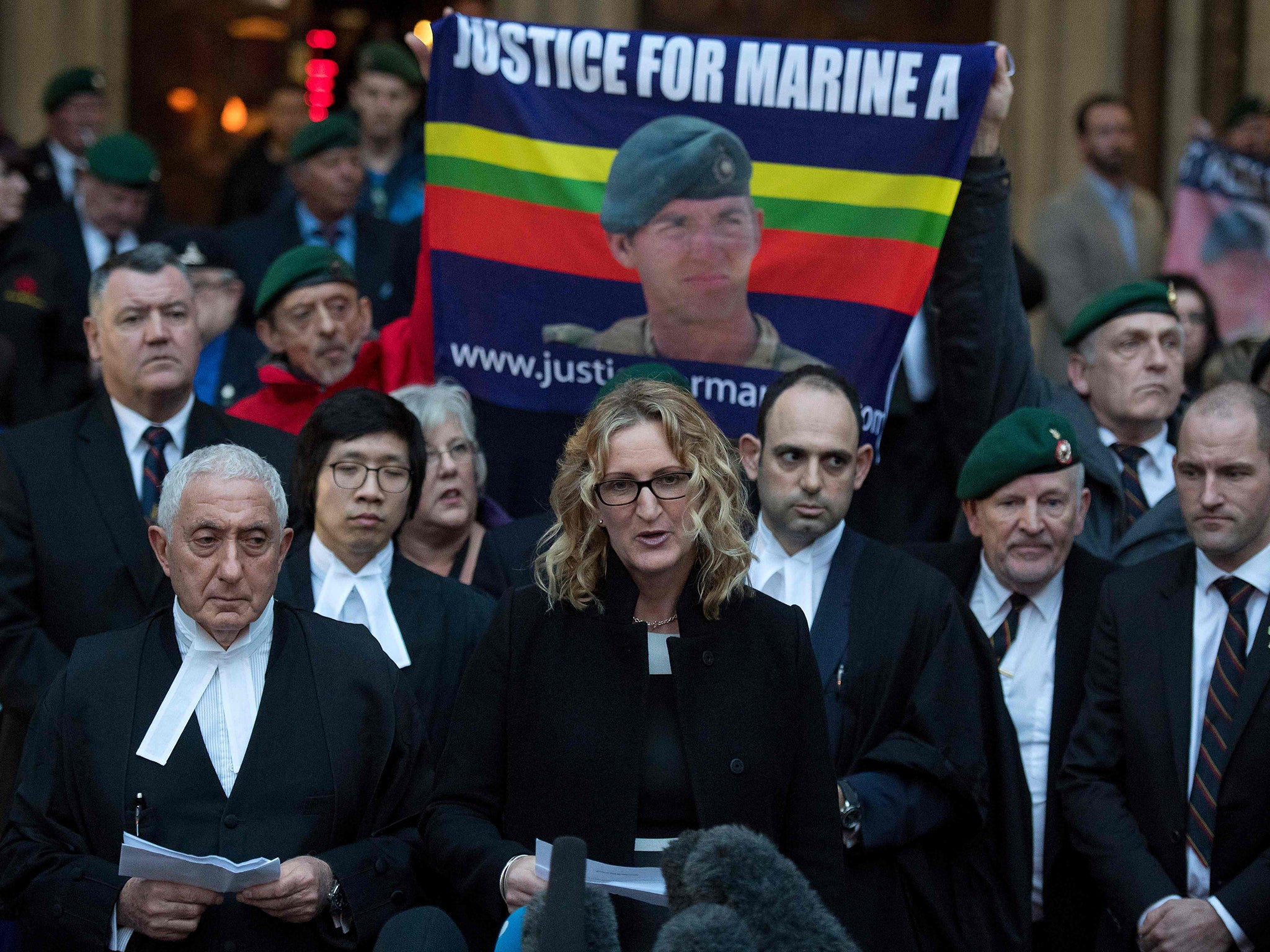The manslaughter charge against British marine, Alexander Blackman, sends a serious message to the military
Blackman has been cleared of murder, but manslaughter is still a very serious offence and sends a very different signal compared to that which would have been sent by discharging him altogether

A historic murder conviction against British marine, Alexander Blackman, was yesterday overturned and replaced with that of manslaughter on the grounds of diminished responsibility.
The case raises war’s most glaring oxymoron – the idea of military ethics.
The fact that war can involve the deliberate taking of human life, but that even though one is allowed to, or even expected to do something that is normally prohibited, one must still do it within the law, seems very hard to explain or justify to many people outside of the military. To those within the military, it is something that is understood very well and is part of their core professional identity.
In normal life there is a general prohibition on murder – murder is something that is considered wrong. However, that doesn’t mean that all killing is considered murder. An individual acting in legitimate self-defence may kill an attacker, but as long as that action was necessary and the force employed was not excessive in relation to the perceived threat, that killing is not regarded as murder.
When one uses lethal force on behalf of one’s state or one’s political community in a war, that too is generally not regarded as murder. We accept that it is excusable or even sometimes worthy to kill in such situations.
Of course, that doesn’t mean that all killing in war is justified – it is still possible to commit murder within a war, for example deliberately targeting a non-combatant or a surrendering combatant could be considered murder and a war crime. This was the basis of the original conviction against Blackman, who was until now, serving a life sentence in a civilian prison.
If the importance of the rules are understood so well, why do they get broken? Just as in everyday life, there are many reason why this could be so. One of the factors that can have a profound influence on behaviour is the situation people find themselves in. It is hard to imagine a more extreme or stressful environment than war. Even good people can do bad things in certain environments (and may not even recognise them as wrong at the time) and the evidence suggests that relying on strength of character alone to prevent slipping into such behaviour is unlikely to be of much help. In Blackman’s case, the appeal court judges ruled that: “Given his prior exemplary conduct, we have concluded that it was the combination of the stressors, the other matters to which we have referred and his adjustment disorder that substantially impaired his ability to form a rational judgment.” In short, Blackman’s mental health and ability to act in accordance with military ethics had been impaired by sustained conflict.
The problem this raises is that these conditions are inherent to the nature of war. What does this mean for service personal in the future and for the military organisation to which they belong?
Violations of the rules and norms of war do not have to be accepted as inevitable. The best way of challenging rule-breaking behaviour is to prevent such habits being established in the first place. Professional military legal and ethics training seeks to ensure that institutions and structures are in place to help develop effective and appropriate decision-making in stressful situations, but also to internalise moral behaviour so that it becomes part of one’s core professional (and in some cases also personal) values.
However, training and character development are not enough. Military leadership also has a core role in shaping the military environment. Evidence is clear from all walks of life that rules will are far more likely to be broken if there is no fear of oversight or punishment. If the rules are not enforced, they come to be seen as effectively optional and therefore not adhered to, either because the action is never going to be found out or, if it is, because there’s a belief that repercussions are unlikely. If people feel they are acting in a consequence-free environment, expecting adherence to the rules seems naïve in any situation, let alone wartime. That is precisely why the rules must be applied and be seen to be applied by the chain of command and enforced by the society that sends them to do their tasks.
Military leaders must also recognise and understand the effect that the environmental factors are having on their personnel and take appropriate action to ensure that problems are dealt with before they come to a head. When those military leaders are themselves facing the same environmental factors, this can be a profound challenge, but evidence is again clear that it is possible to ‘reset’ a unit’s moral compass and maintain appropriate discipline even in the most extreme of circumstances.
When fighting an opponent who simply doesn’t care about the rules – why should we apply them at all? Simply put, its not about ‘them’, it’s about ‘us’. Our values cannot be defended by flouting them. One could add that we have a duty of care to protect our own people as well, by ensuring that they don’t end up living with the knowledge that they have done something terrible and we did nothing to prevent it. This is a path to PTSD and the type of long term mental health issues that we are only just starting to recognise today.
Blackman has been cleared of the most serious of crimes – murder – but he has admitted the lesser crime of manslaughter on the grounds of diminished responsibility. The debate about whether this was the more appropriate offence to be charged with from the start will no doubt continue, but given the situational factors that came out in the appeal process, the impact that this had on Blackman and the mitigation that the court felt that this provided, the final verdict will appear more fitting to many people, including many in the military. However, this is still a very serious offence and sends a very different signal compared to that which would have been sent by discharging Blackman altogether. It has been demonstrated that even the battlefield is not a consequence free place when it comes to obeying the law. In that sense, I do not fear that this has set a dangerous precedent.
David Whetham is Director of the King’s College London Centre for Military Ethics


Join our commenting forum
Join thought-provoking conversations, follow other Independent readers and see their replies